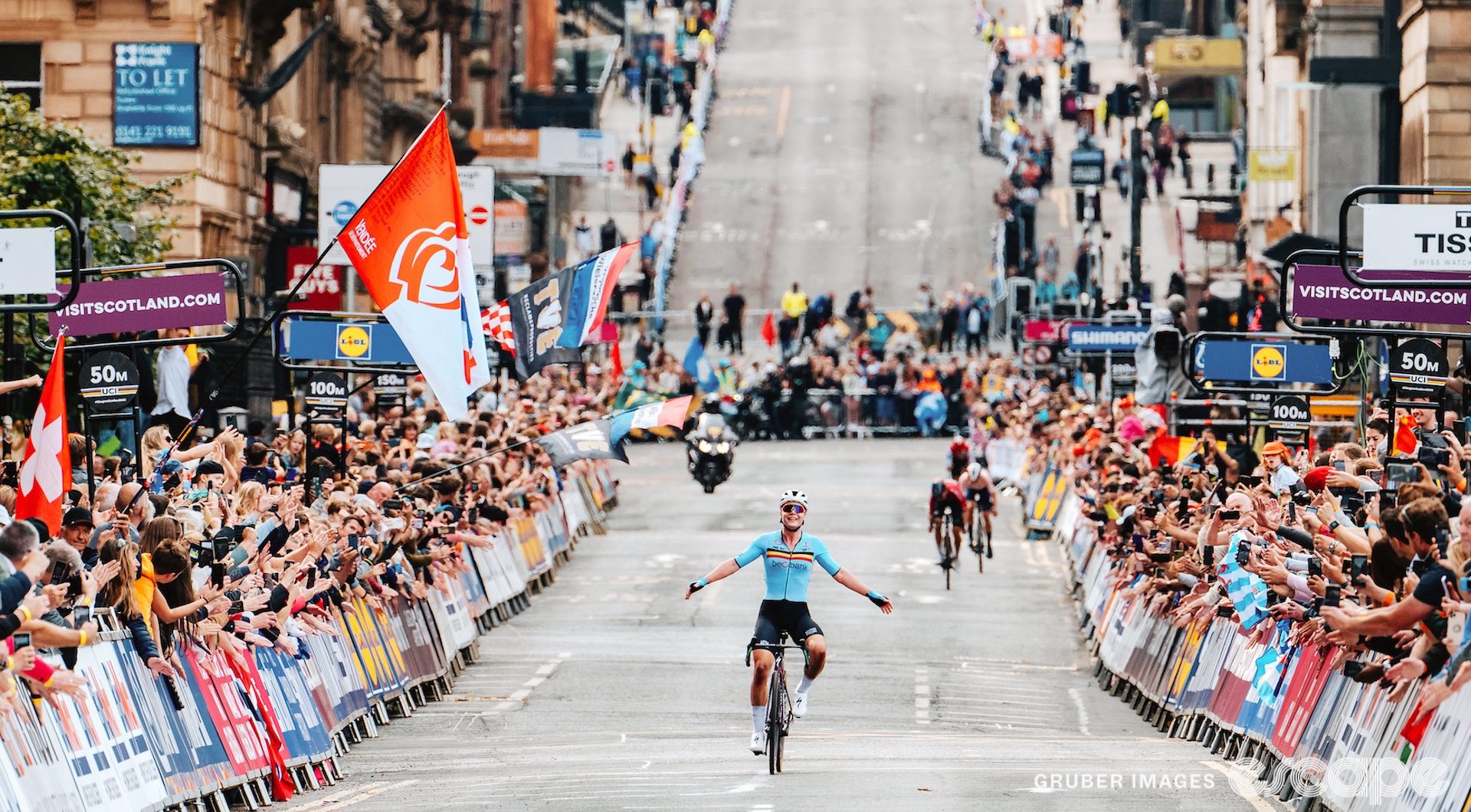Lotte Kopecky has worn the rainbow jersey with pride for the last year, and in it has achieved some of the best results of her career including a win at Paris-Roubaix Femmes, second overall at the Giro d’Italia, and the overall win at Tour de Romandie. In all, she’s won 13 races, not including classification victories and time trials. Not only that, but in the last year she has become a force in the Grand Tours, to match her already intimidating performances in the one-day races.
But all things must end – or at least be challenged – and on Saturday Kopecky will have to either reclaim the jersey she’s become so accustomed to or hand it over to someone else.
Kopecky may be the out-and-out favourite to win Worlds again this year, but she’s up against some steep competition. The Dutch team is stacked, as usual, while a few riders will have the full support of their nations like Poland for Kasia Niewiadoma and Italy for Elisa Longo Borhgini.
The course is a dynamic one, constantly undulating with a few notable climbs within the circuit that will make up most of the women’s race.
Regardless of how the race goes, there are a lot of riders with high ambitions going into Zurich so there will be some surprises in store for everyone, and making this Worlds one to watch.
The Basics
When: Saturday, September 28th from 12:45 to (roughly) 16:45 CET
Live coverage set to start at 12:45 CET
Distance: 154 km, 2,384 m
Live coverage: Discover+ in the UK, MAX in most of Europe, FloBikes in the US and Canada, SBS in Australia
The Course
The race starts east of Zurich near Uster and circles around Lake Greifensee before heading towards Zurich for the circuits that contain the rest of the race. The women have one climb in between the lake and the circuits, a 1.3 km ascent averaging 10% with maximum grades near the top of 18%.
After 30 km the race enters the circuits for the remaining 124 km. There are three-ish climbs per circuit and the women will cover them four times.

Once on the circuits, there will be very little time for recovery, so as is often the case with Worlds, the race will become one of attrition. The riders enter the circuit midway on the first loop and will cross the finish for the first time 46.7 km into the race. From there they tackle the first climb of the circuit, a 1.7 km ascent averaging 5.4% with maximum grades of over 14%.
The longest climb of the race is next: a 2.5 km climb of 5.3% with some bits of over 9%. This second climb isn’t as steep but once the riders reach the top they have about 9 km of rolling terrain before they descend to the final climb before the finish.

The final climb is another short, snappy one. At only 1.6 ish km long and an average grade of 3.3% with some sections of 6.6%, it offers a little something before the final 2.5 km flat to the finish.
Overall the circuit is hard and at parts technical. After the finish line, the women start climbing in town and hit the steepest part of the race followed by a big 5-6% section to the top of the climb. There’s no downhill after so the steep part is for sure where gaps can be made.
Separations can go either way after the steep part: they can close if the group is strong enough to reel the climbers back in or they can open up more over the top if those behind aren’t working well together. If there’s no cooperation and the front is strong, it will be a challenge to pull them back.
From the top of the long climb, there’s still 20 km to go more or less, but there are some technical sections with two steep kickers before the descent. The finale is similar to the time trial finish along the lake: very flat, very fast.
The biggest challenge is the beginning of the circuit, but there is time to chase back to early moves with the right cards.
The Contenders
With the terrain, the race leans toward someone who can sprint (if it comes down to a small group of, say, four) or someone who can break away alone and make it to the line. All signs point to Kopecky keeping her rainbow bands for another year, but there are a few women who will be keen to challenge the Belgian woman on Saturday.
Kopecky one leg up on the rest
Since the Olympics, Kopecky has been targeting the Worlds. She skipped the Tour de France Femmes avec Zwift, even after she placed second overall at the Giro d’Italia, and has her sights set on keeping her status as World Champion.
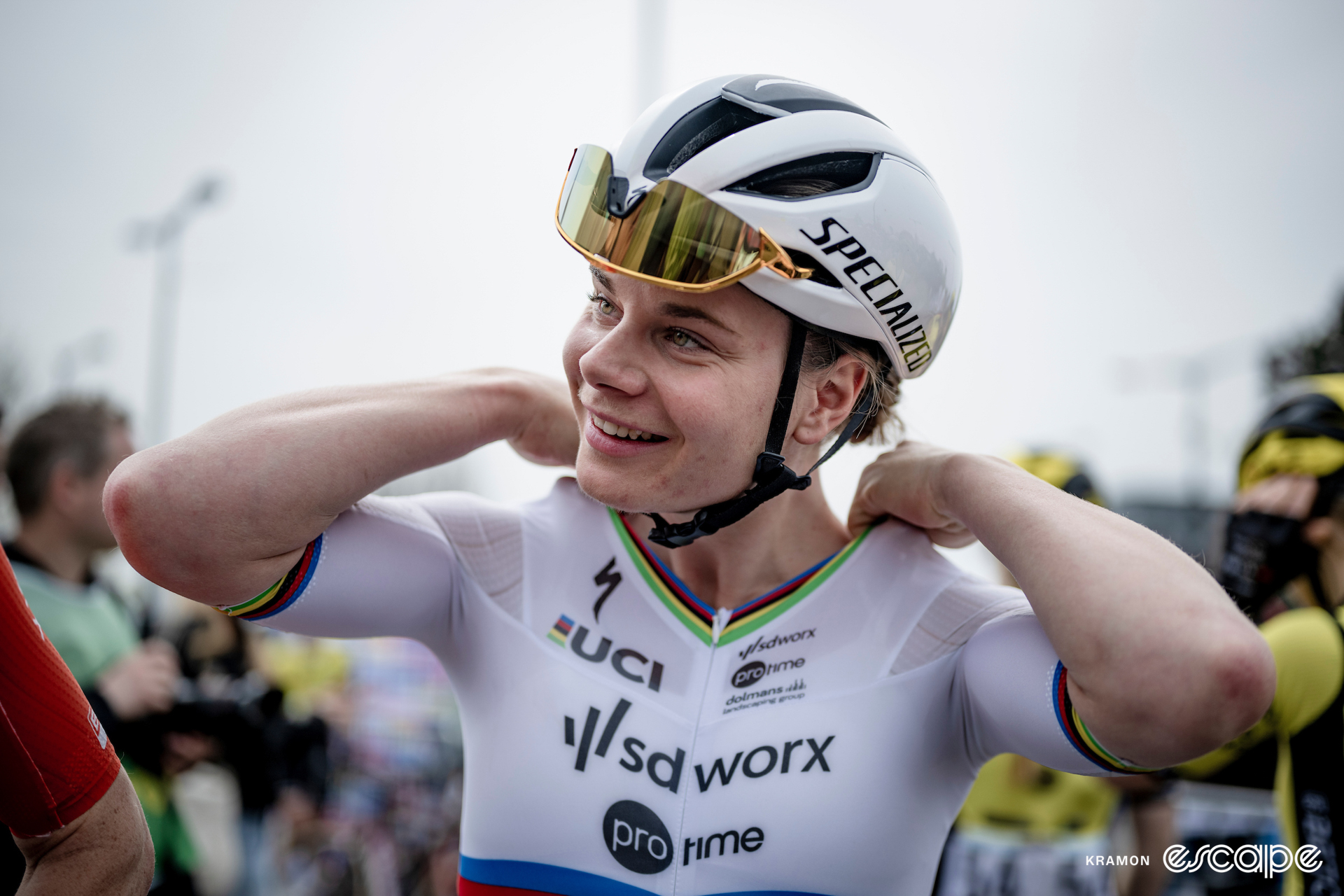
Her accomplishments this year have been wildly broad. From climbing to win the UAE Tour, winning her second Strade Bianche, making history at Paris-Roubaix Femmes, then taking two of four stages to win Tour of Britain, followed by both Belgian national titles in the road race and the time trial, and recently winning Tour de Romandie. Kopecky is in a league all her own and has the full support of Belgium behind her.
If the race comes down to a select group, Kopecky will sprint to victory. If she has any chance to get away from the rest of her competition, she can do it.
Can the Dutch get out of their own way?
When it comes to strength Kopecky is already potentially ahead of the Dutch, but where they would best her is if they used their incredible list of riders as one unit to outplay the defending champion. Unfortunately for the Dutch team, and fortunately for Kopecky, they have a habit of working in mysterious ways that can often cause them to miss out on the top step. The Tokyo Olympic road race comes to mind as a prominent example, but there have been many occasions over the years where the multiple-leader approach has backfired on them.
Demi Vollering is coming in as maybe the strongest among the Dutch riders, as she proved on Sunday when she rode to second in the individual time trial. In the last year, Vollering has made her mark in stage races, but she’s also won her fair share of one-day races from the Amstel Gold Race to Strade Bianche. It’s always the hillier races that she shines at, and this race is indeed hilly. Where Vollering is lacking is in race-savviness. It will depend on how she uses her bullets and timing.
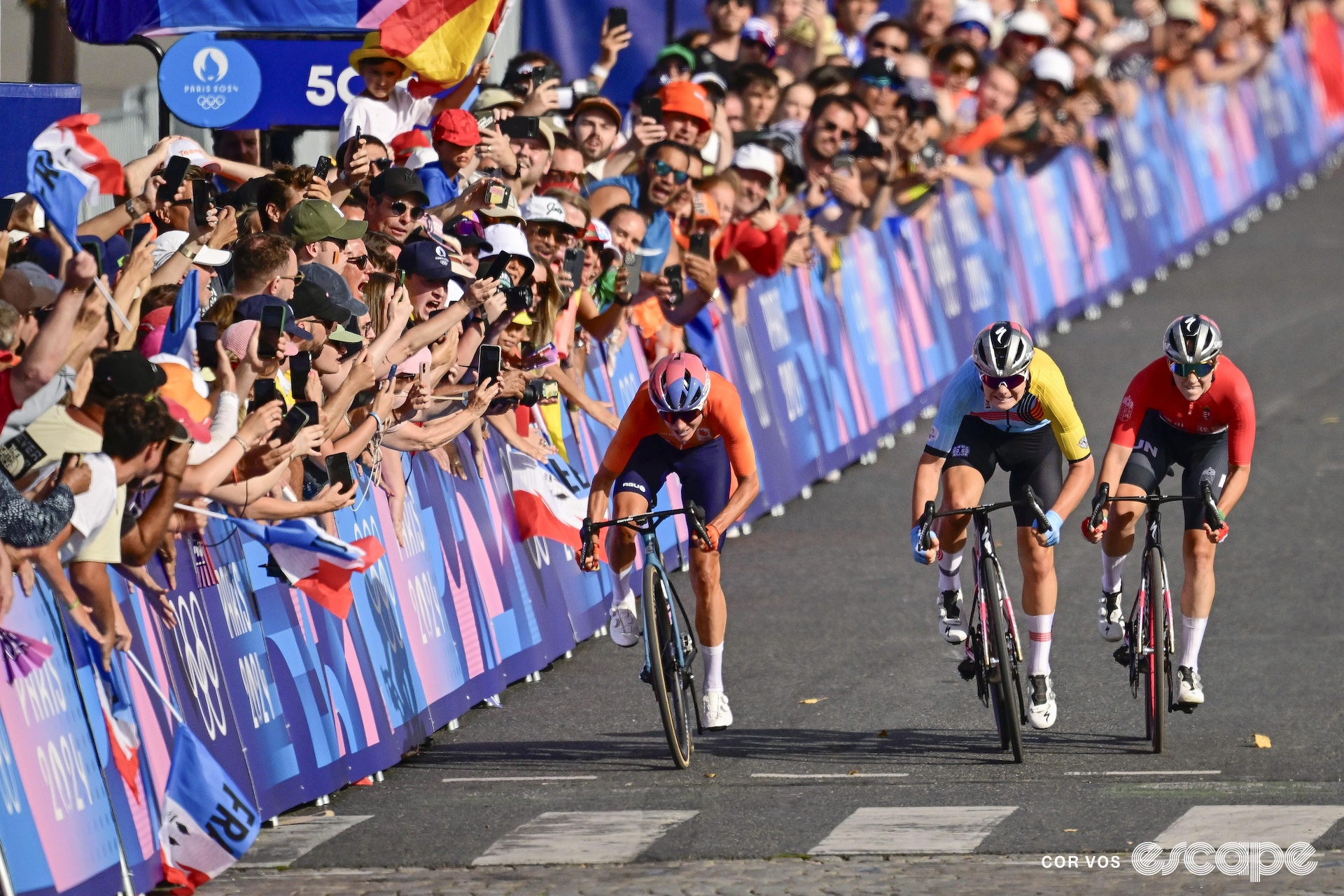
Marianne Vos, on the other hand, is climbing better this season than she has in years. She is up to her ears in race-savvy and it seems like she has the strength to be there in the finale if she can stay in contact over the climbs. Since none of the climbs is super long, she is in for a chance, and she is one of the few riders who could make it to the end and then outsprint Kopecky.
The rest of the Dutch team is formidable. Mischa Bredewold, Riejanne Markus, and Pauliena Rooijakkers are all experienced and strong in their own right. Plus, Puck Pieterse will be joining the Dutch team for her first road World Championships after winning the XCO at the Mountain Bike World Championships in early September.
Other top favourites
Tour de France Femmes winner Kasia Niewiadoma is surrounded by a strong Polish team this year, especially with new SD Worx-Protime signing Marta Lach. The World Gravel Champion missed last year’s road worlds in Glasgow due to an illness, but she normally shows up to these types of events on fire. Her best chance is to win from a similar select group to that of Tour of Flanders, where she came second behind Elisa Longo Borghini.
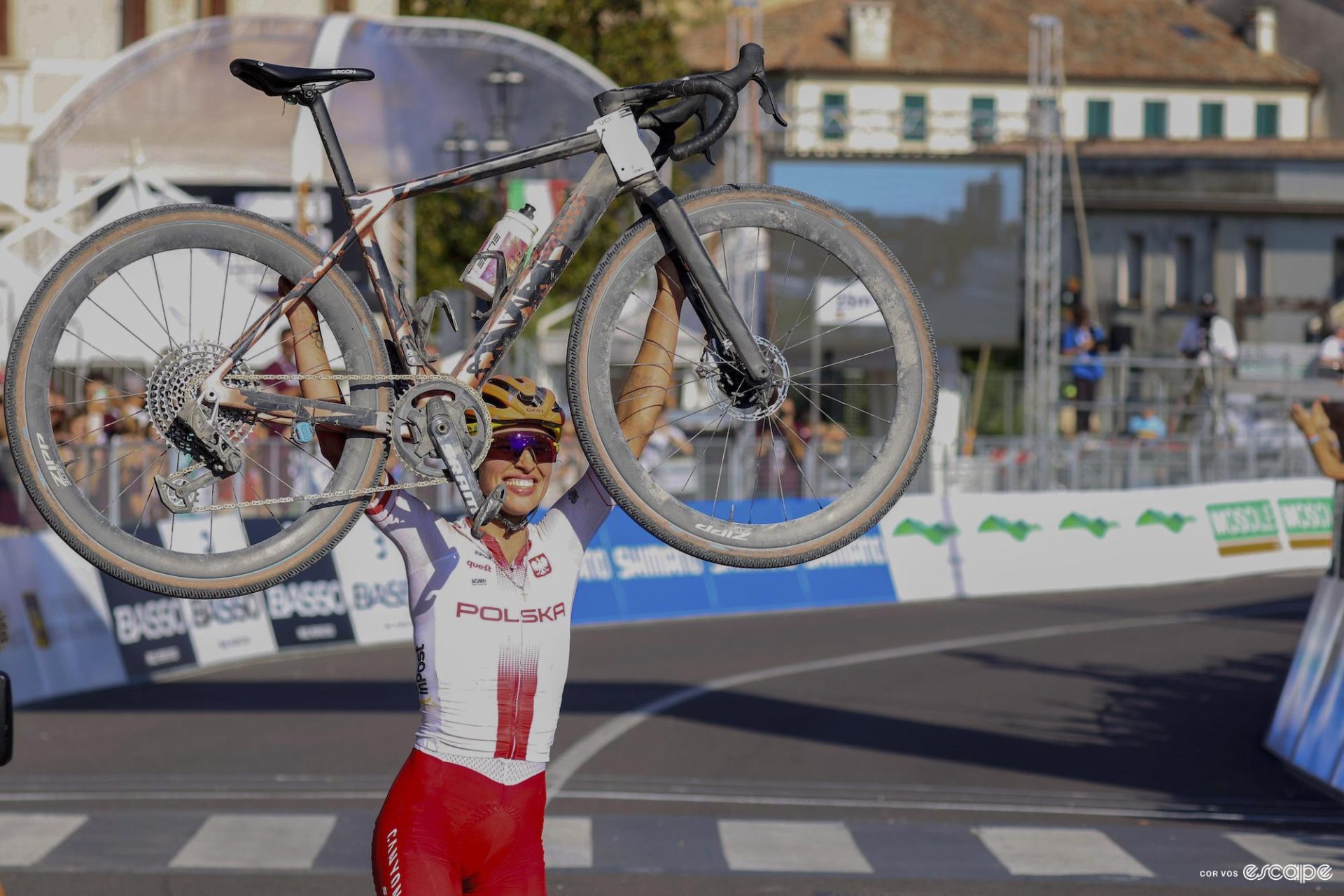
Speaking of Elisa Longo Borghini, Italy is also one of the strongest teams on the start line, and the Giro winner will be their leader. Longo Borghini’s one-day racing has come a long way over the years, to winning Paris-Roubaix Femmes and, this year, Flanders, but she needs to find herself in the right place at the right time. Her sprint has also really come along; if she comes to the line in a small group that doesn’t contain Kopecky or Vos she can win.
Kristen Faulkner is a bit of an unknown. The Olympic champ hasn’t raced since the Tour de France Femmes, which could either mean she spent time away preparing for another peak in form or that she’s needed the time to recover from everything that comes along with winning Olympic gold. If the form is there she will be amongst it, but a win may be hard to get as she will have more eyes on her this time around.
Denmark has two strong riders Cecilie Uttrup Ludwig and Emma Norsgaard. Although neither are five-star favourites for the race, they are both in pretty good form and they are both hungry. Uttrup’s season was derailed by an early season crash, but she’s coming back into it now. Last year she rode to third in Glasgow, and she’s one who handles pressure well. Norsgaard will need to really temper her efforts if she is to feature, but she’s become more adept at climbing in the past two years, and if she can get to the line in front, she can sprint better than most.
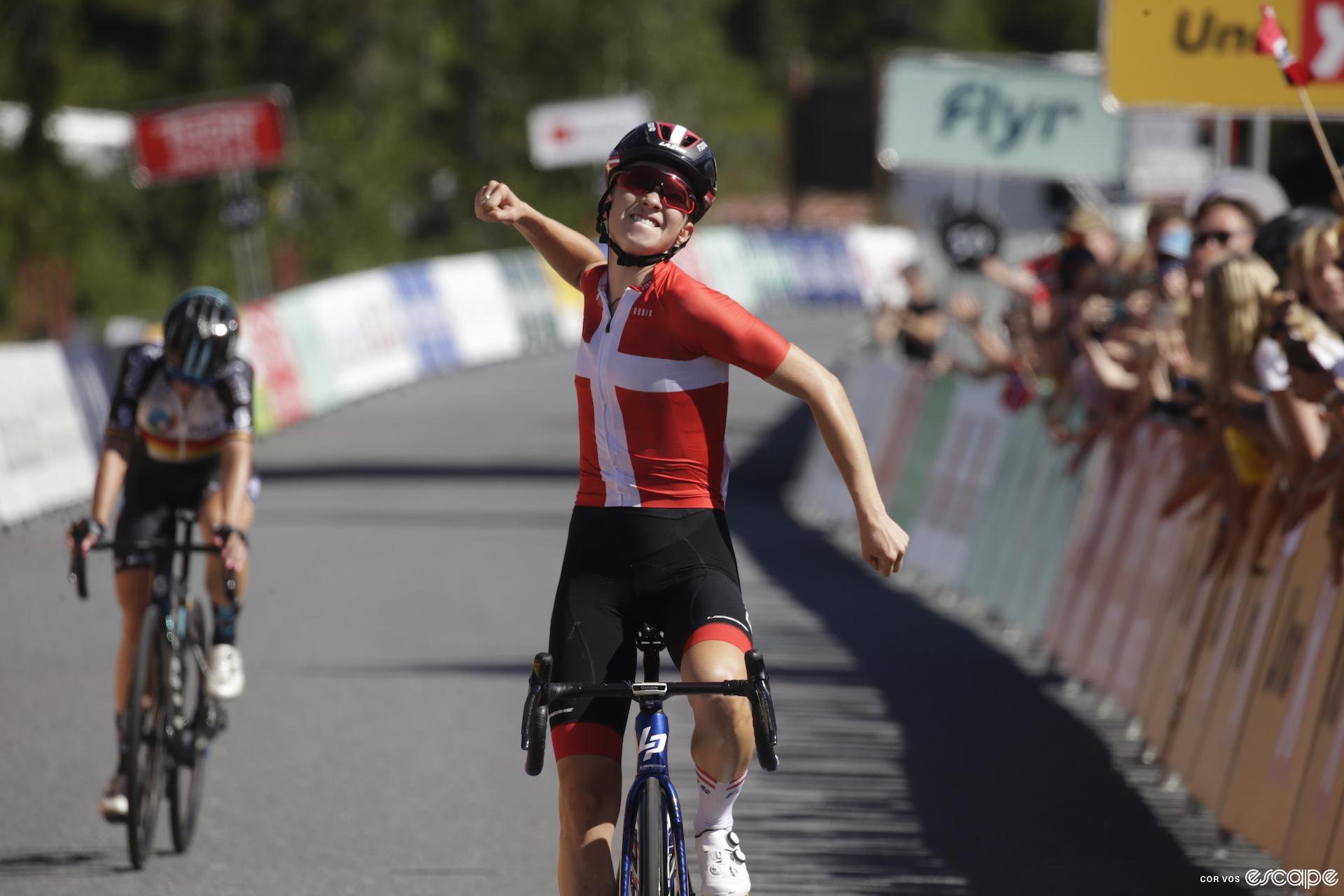
Liane Lippert is another rider who started their season late due to an off-season injury, but the setback means her late-season fitness is fantastic. From winning a stage of the Giro to finishing twice third in stages of the Tour, the German rider could pull of a podium for sure.
Tour stage winner Blanka Vas will not have the team support of her competitors, but she proved when she finished fourth at the Olympic Games after landing in a break with Vos that she doesn’t need them. The Hungarian rider has become a force since moving her attention full-time to the road this season. She’s another one who can climb reasonably well and sprint reasonably well.
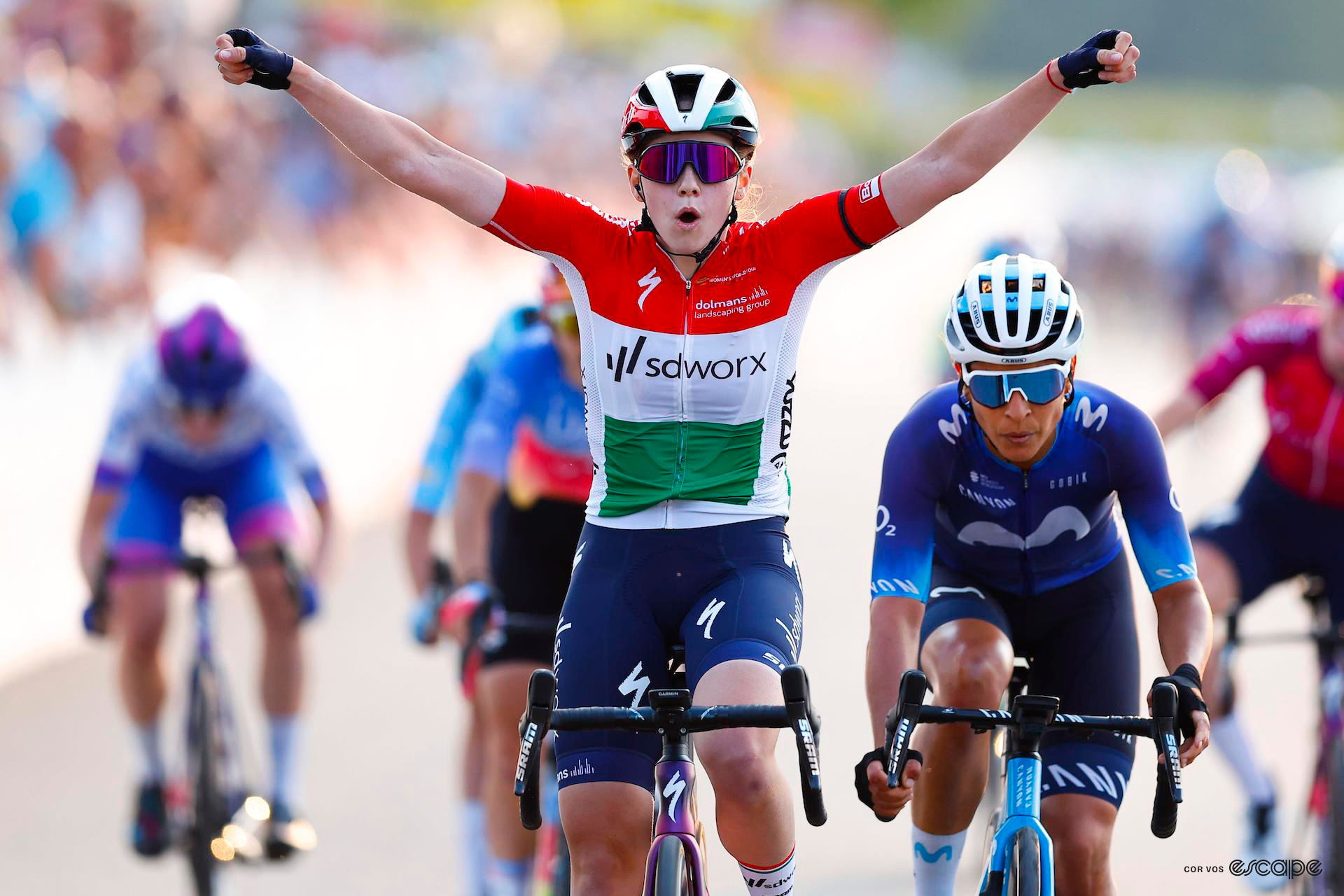
Australia will start the race on a high after winning the Team Relay on Wednesday, with newly crowned Time Trial World Champion Grace Brown as their star contender. The course is great for Brown, similar to the hilly Classics where she has excelled in the past. The road rainbow jersey will be a harder get than the one she won on Sunday, but it’s not out of the question based on her current form.
Finally, the wildest of all wild cards: Pauline Ferrand-Prévot. The Frenchwoman returns to the road to test her place in the peloton 10 years after winning the women’s World Championships in Pomferrada. She will have a lot of attention on her, following her success on the mountain bike over the last couple of years, but her road form is a huge question mark. Still, she could land herself with a result, something to take to Visma-Lease a Bike next year.
Star Ratings
⭐️⭐️⭐️⭐️⭐️: Lotte Kopecky
⭐️⭐️⭐️⭐️: Marianne Vos, Demi Vollering
⭐️⭐️⭐️: Elisa Longo Borghini, Kasia Niewiadoma
⭐️⭐️: Kristen Faulkner, Liane Lippert, Grace Brown
⭐️: Emma Norsgaard, Blanka Vas, Cecilie Uttrup Ludiwg
🐻: Christina Schweinberger (Austria), Anna Henderson (GB), Elise Chabbey (SWI) Noemi Rüegg (SWI), Chloe Dygert (USA), Pauline Ferrand-Prévot (FRA).
What did you think of this story?
